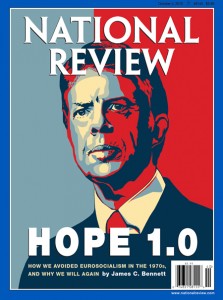Tom Barnett Waves Goodbye to the Blogosphere
Thursday, September 23rd, 2010
Dr. Thomas P.M. Barnett has left the building…..
Hiatus for now, decisions to follow
I’m going to shut down this blog for the foreseeable future.
My career and workload have evolved significantly since the recession hit, and I just find that I can’t justify the time and effort required to keep the blog running. Other opportunities/responsibilities beckon, and that array doesn’t value/support this endeavor, so while I’ve enjoyed it, this is simply an adjustment I need to make.
I will keep the site up for now.
I will continue to keep writing at places that can pay. I just realize that I’ve come to the end of a career model that says I can play LoneWolf@eponymous.com and make that work. A bit sad, as it’s been fun, but as someone who hates to repeat himself and loves to always move onto the next experience/model, I likewise enjoy the pressure to reinvent myself. I just can’t move down that path while simultaneously maintaining the old one–not enough hours in the day….
Sad to see Tom shut down his fine blog but I respect his motivations. Furthermore, while Dr. Barnett always had his detractors on the margin, it is undeniable that he and his ideas about grand strategy had a significant impacton both the public and the policy elite where “the Brief” from The Pentagon’s New Map enjoyed a cult status for a number of years. It was Tom more than any other “thought leader”, whose globetrotting briefing sessions brought military theory and strategy to a general public confused about the tumults of the post 9-11 world.
I’d like to take a moment and thank Dr. Barnett for several acts of kindness over the years, for the friends I have met as a result of sharing a common interest in his work and the stimulating exchanges we have had from time to time that still influence my thinking on strategy and policy. There’s no doubt in my mind that we will still be hearing from Tom in op-eds, magazines, journals, books for years to come.

 life in 5th century BC, but it will really help one develop an appreciation for the aspects of human nature that are unchanged through time.
life in 5th century BC, but it will really help one develop an appreciation for the aspects of human nature that are unchanged through time. 
 officers, genteel Harvard men, desperados, captive madmen, wild animals in locales from the silence of nature to the sound of battle with orders barked over the cries of wounded men. Every story involves a fistfight, a gun, a test of integrity and manly honor where respectable men who are “right square” do their duty without complaint and few concessions, except perhaps to a glass of whiskey “taken for medicinal purposes”.
officers, genteel Harvard men, desperados, captive madmen, wild animals in locales from the silence of nature to the sound of battle with orders barked over the cries of wounded men. Every story involves a fistfight, a gun, a test of integrity and manly honor where respectable men who are “right square” do their duty without complaint and few concessions, except perhaps to a glass of whiskey “taken for medicinal purposes”.


